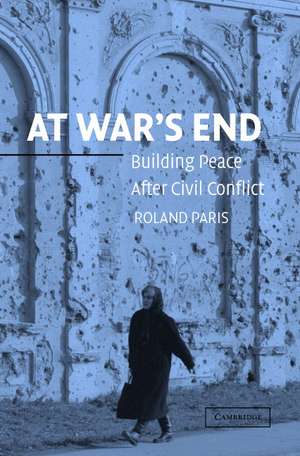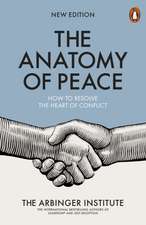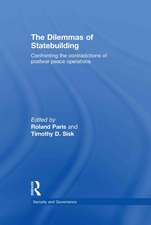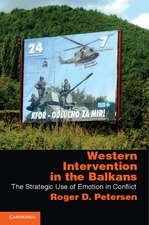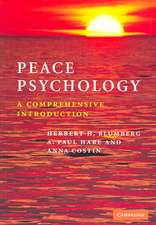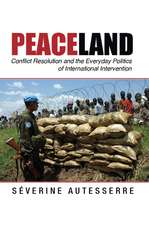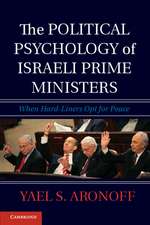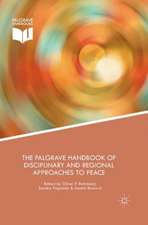At War's End: Building Peace after Civil Conflict
Autor Roland Parisen Limba Engleză Paperback – 23 mai 2004
| Toate formatele și edițiile | Preț | Express |
|---|---|---|
| Paperback (1) | 216.32 lei 17-24 zile | +20.09 lei 6-12 zile |
| Cambridge University Press – 23 mai 2004 | 216.32 lei 17-24 zile | +20.09 lei 6-12 zile |
| Hardback (1) | 554.83 lei 6-8 săpt. | |
| Cambridge University Press – 23 mai 2004 | 554.83 lei 6-8 săpt. |
Preț: 216.32 lei
Nou
Puncte Express: 324
Preț estimativ în valută:
41.39€ • 43.22$ • 34.26£
41.39€ • 43.22$ • 34.26£
Carte disponibilă
Livrare economică 10-17 martie
Livrare express 27 februarie-05 martie pentru 30.08 lei
Preluare comenzi: 021 569.72.76
Specificații
ISBN-13: 9780521541978
ISBN-10: 0521541972
Pagini: 304
Ilustrații: 5 b/w illus.
Dimensiuni: 152 x 229 x 17 mm
Greutate: 0.5 kg
Editura: Cambridge University Press
Colecția Cambridge University Press
Locul publicării:New York, United States
ISBN-10: 0521541972
Pagini: 304
Ilustrații: 5 b/w illus.
Dimensiuni: 152 x 229 x 17 mm
Greutate: 0.5 kg
Editura: Cambridge University Press
Colecția Cambridge University Press
Locul publicării:New York, United States
Cuprins
Part I. Foundations: 1. The origins of peacebuilding; 2. The liberal peace thesis; Part II. The Peacebuilding Record: 3. Introduction to the case studies; 4. Angola and Rwanda: the perils of political liberalization; 5. Cambodia and Liberia: democracy diverted; 6. Bosnia and Croatia: reinforcing ethnic divisions; 7. El Salvador, Nicaragua, and Guatemala: reproducing the sources of conflict; 8. Namibia and Mozambique: success stories in southern Africa?; Part III. Problems and Solutions: 9. Bad theory, bad practice: the limits of Wilsonianism; 10. Towards more effective peacebuilding: institutionalization before liberalization; 11. Lessons learned and not learned: Kosovo, East Timor, Sierra Leone, and beyond.
Recenzii
'At War's End is the state of the art treatment of the dilemmas of reconstruction and peacebuilding after war, intervention and civil conflict.' Michael Ignatieff, Director, Carr Center for Human Rights Policy, Harvard University
'At a moment when politicians and pundits are debating the wisdom of nation-building, Roland Paris brings us an important and groundbreaking book. Theoretically rich, historically informed, and analytically innovative, this authoritative volume will be invaluable to scholars and practitioners alike who are interested in understanding what it takes to build peace after civil wars' Thomas G. Weiss, Presidential Professor and Director, Ralph Bunche Institute for International Studies, CUNY Graduate Center
'This is the best book yet written on peacebuilding operations, a must for both academics and practitioners.' Peter Viggo Jakobsen, Associate Professor in International Relations, University of Copenhagen
'It is hard to imagine a more timely study than Roland Paris's superb analysis of the peacebuilding experience of the last decade. As the United States gropes its way through the morass of Iraq, its leaders need to read At War's End and concentrate on developing timetables and building institutions.' Robert A. Pastor, Vice President of International Affairs, American University
'This book will surely stand as the definitive treatment of the intellectual and ideological origins of international peacekeeping and peacebuilding in the post-Cold War era. The breadth of cases, the rigorous assessment of outcomes, and depth of policy insight are most impressive.' Fen Osler Hampson, Professor of International Affairs and Director, Norman Paterson School of International Affairs, Carleton University
'Few studies of peacekeeping and peacebuilding merit the description 'breakthrough.'…This is one of them.' Michael Pugh, Director, University of Plymouth International Studies Centre and Editor, International Peacekeeping Journal
'At War's End is a major contribution to an understanding of the theory, practice, and consequences of peacekeeping that should be read by scholars and practitioners alike. Roland Paris expertly demonstrates how peacekeeping has evolved from the modest attempt to keep the peace into the much more ambitious agenda of engineering the socio-political conditions for a stable peace. But, as Paris documents, the road to hell can be paved with good intentions; the attempt by the international community to promote democracy and markets has created, in various places, not a liberal peace but instead renewed competition and violence. His recommendations should be debated seriously by all those who are concerned about the future of peacekeeping.' Michael Barnett, Professor of Political Science and Director, International Relations Program, University of Wisconsin
'… At war's end deserves to become the essential text on peacebuilding operations for practitioners and analysts alike.' International Affairs
'At War's End is a timely and very good addition to the growing literature in post-conflict studies. … Paris's book is appropriate for any liberalization or conflict studies, as both are covered aptly. It is a strong addition to the literature on peacebuilding methods and strategies.' Journal of Peace Research
'Roland Paris does us a great service in At War's End by stripping peacebuilding back to its ideological origins and providing the reader with a useful assessment of the theoretical assumptions which underlie it.' Democratiya
'At a moment when politicians and pundits are debating the wisdom of nation-building, Roland Paris brings us an important and groundbreaking book. Theoretically rich, historically informed, and analytically innovative, this authoritative volume will be invaluable to scholars and practitioners alike who are interested in understanding what it takes to build peace after civil wars' Thomas G. Weiss, Presidential Professor and Director, Ralph Bunche Institute for International Studies, CUNY Graduate Center
'This is the best book yet written on peacebuilding operations, a must for both academics and practitioners.' Peter Viggo Jakobsen, Associate Professor in International Relations, University of Copenhagen
'It is hard to imagine a more timely study than Roland Paris's superb analysis of the peacebuilding experience of the last decade. As the United States gropes its way through the morass of Iraq, its leaders need to read At War's End and concentrate on developing timetables and building institutions.' Robert A. Pastor, Vice President of International Affairs, American University
'This book will surely stand as the definitive treatment of the intellectual and ideological origins of international peacekeeping and peacebuilding in the post-Cold War era. The breadth of cases, the rigorous assessment of outcomes, and depth of policy insight are most impressive.' Fen Osler Hampson, Professor of International Affairs and Director, Norman Paterson School of International Affairs, Carleton University
'Few studies of peacekeeping and peacebuilding merit the description 'breakthrough.'…This is one of them.' Michael Pugh, Director, University of Plymouth International Studies Centre and Editor, International Peacekeeping Journal
'At War's End is a major contribution to an understanding of the theory, practice, and consequences of peacekeeping that should be read by scholars and practitioners alike. Roland Paris expertly demonstrates how peacekeeping has evolved from the modest attempt to keep the peace into the much more ambitious agenda of engineering the socio-political conditions for a stable peace. But, as Paris documents, the road to hell can be paved with good intentions; the attempt by the international community to promote democracy and markets has created, in various places, not a liberal peace but instead renewed competition and violence. His recommendations should be debated seriously by all those who are concerned about the future of peacekeeping.' Michael Barnett, Professor of Political Science and Director, International Relations Program, University of Wisconsin
'… At war's end deserves to become the essential text on peacebuilding operations for practitioners and analysts alike.' International Affairs
'At War's End is a timely and very good addition to the growing literature in post-conflict studies. … Paris's book is appropriate for any liberalization or conflict studies, as both are covered aptly. It is a strong addition to the literature on peacebuilding methods and strategies.' Journal of Peace Research
'Roland Paris does us a great service in At War's End by stripping peacebuilding back to its ideological origins and providing the reader with a useful assessment of the theoretical assumptions which underlie it.' Democratiya
Descriere
This 2004 book explores the challenge of rehabilitating countries after civil wars.
